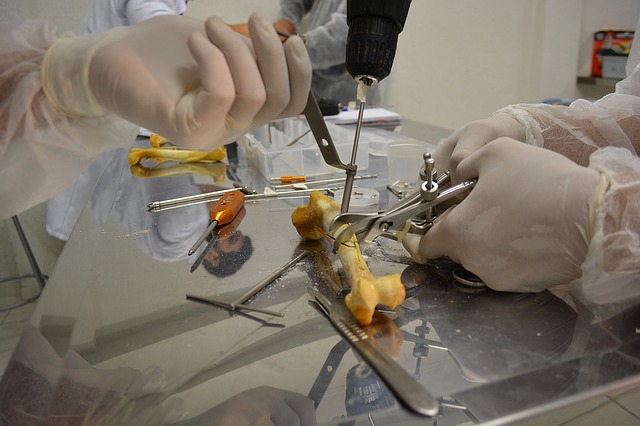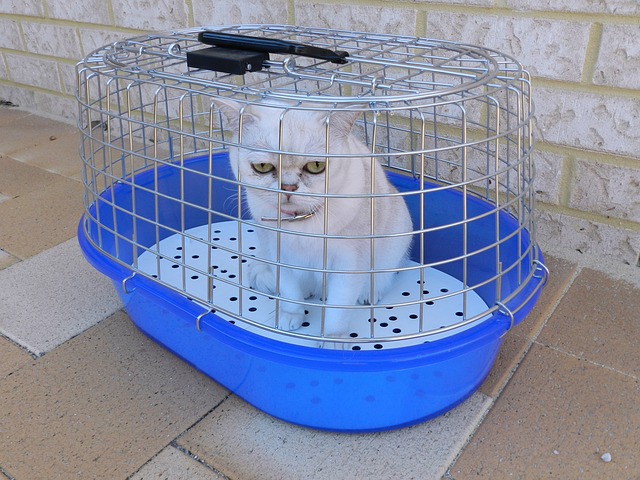Veterinary techs perform a hands-on job.
They should know how to safely administer medications, restrain animals, and perform basic lab tests.
You may be wondering how students can learn this online.
It varies by institution, but generally, all accredited online vet tech programs include some in-person requirements.
The difference between on-campus and online programs is the flexibility that comes with distance education degrees.
Online vet tech programs give you more control over when and how you gain your clinical experience.
Schools ask students to volunteer or work in an approved vet clinic for a specific number of hours, but often, students can arrange these hours whenever it’s convenient for them.
Academic courses can be completed fully online, so students can work full-time and study on weekends and nights.
While assessing your program options, remember that online degrees come in two categories.
Mostly online:
These type of programs offers maximum flexibility.
Some programs come in an accelerated format, others allow students to go through the program part-time.
With a combination of multi-media presentations, online textbooks, and discussion boards, these degrees can be completed almost entirely online.
Students can collaborate both with each other and faculty members through digital sources.
Most online vet tech programs include clinical requirements.
However, they can still be completed off-campus, at a vet clinic on a schedule that the student chooses.
Lab work on-campus can be limited to only a few times per semester.
The programs listed in this post can be completed mostly online.
Partially online:
Vet tech schools that offer partially-online programs let students complete academics and general education requirements through distance learning.
However, clinical requirements should be completed on-campus.
These programs do not necessarily require students to work or volunteer at vet clinics while obtaining their degrees.
While these programs are not as flexible as the mostly-online ones, they can be a good option for those who have limited hours to spend on-campus every week.
Time spend on-campus can be dedicated to clinical classes.
Other program requirements can be completed on a schedule convenient for you.
Article Table of Contents
Online Vet Tech Program Options
If you are wondering about the time you will have to dedicate to become a vet tech, the answer is based on the type of degree you choose to earn.
Online vet tech schools have two types of degrees: an associate’s and a bachelor’s degrees.
They last for two and four years respectively.
However, this isn’t the only difference between the two degrees.
You should choose a degree depending on where you hope your career to go in the long run.
Associate Degree
An associate degree is offered by most accredited online vet schools.
So these two-year programs are the standard education for vet techs.
They are also sometimes called veterinary nursing degrees and cover all the basics you need to work in a private clinic.
The programs typically cover small and large animal care, pharmacology, surgical procedures, dentistry, and more.
To be accepted to such a program, you may have to complete general education classes first.
You can do it by enrolling first in a non-major program in the school you selected.
Then, after you complete these prerequisites, you can apply to the vet tech program.
An associate degree is a great choice for those who know they want to work hands-on with animals and enter the workforce quickly.
The employment growth for vet technicians is projected at 20% by 2026, according to the BLS.
So this type of degree can be the fastest way to qualify for these positions.
Bachelor’s Degree
A bachelor’s degree in vet technology is a great option for those who want to be vet technologists or eventually become a veterinarian.
Students may be required to hold an associate’s degree in vet technology to be admitted to the bachelor’s degree program.
This type of degree comes with more advanced education in animal care.
Students gain the skills that prepare them to work not only in private clinics but also with lab animals in research facilities.
The graduates of a bachelor’s degree program can also work outside direct animal care.
They can become administrators in vet clinics, instructors in associate degree programs, or pharmaceutical sales representatives.
Some bachelor’s degrees come with a pre-professional track that can be used as a stepping stone to a vet school and a vet career.
Curriculum Focus: Online Classes & On-Site Clinicals
While individual classes vary by school, all of them cover the same basic topics.
The curriculum is designed to prepare students to provide routine care and work in emergency and high-stress situations.
The programs are broken into academic courses online and on-site clinicals.
You can expect the following from both:
Vet Tech Online Classes
These classes are typically offered online.
They provide the basic knowledge that later will be applied in a clinical setting.
- Animal Anatomy:
This class is usually taught as one of the first ones.
It explores the major body systems, such as skeletal, circulatory, urinary, and respiratory.
At the end of the course, students should know how to identify organs and tissues and understand how systems relate to each other. - Animal Diseases:
This course covers common animal diseases and the response of their immune system.
After this course, not only should students identify diseases but also understand the appropriate preventative measures and treatment to avoid the spread of communicable illnesses. - Pharmacology and Toxicology:
Similar to human medicine, veterinary care uses pharmaceuticals to treat illnesses and maintain well-being.
This class teaches students about the proper administration and potential side effects of vet drugs.
After completing this course, students should know how to recognize various drug classifications, calculate proper dosages, and understand the potential dangers of certain medications. - Animal Behavior:
Vet techs should understand the behavior of animals and proper handling techniques.
This class covers the typical animal responses to stressful situations as well as options for providing care safely.
These courses may focus on cats and dogs or include other species as well. - Veterinary Office Procedures:
Vet technicians mostly work in the exam room, but they may also be responsible for inputting patient records, taking notes, and responding to clinical concerns.
These courses teach the proper way to perform these tasks effectively, keeping patient confidentiality, and complying with government regulations.
Vet Tech On-site Clinicals
Clinicals ensure that students can put the information they learned in lecture classes into practice.
Here are the three classes that each vet tech program may include.
- Anatomy Lab:
Students may have to take an anatomy lab together with online classes in anatomy.
This is a hands-on class that may include necropsy and dissection procedures.
Because of the nature of this class, it may be one of the on-campus requirements of an online degree program. - Emergency and First Aid:
This class teaches students to properly respond to various emergencies.
It covers such topics as trauma, shock, poisoning, cardiac arrest, etc.
After completing this course, students should be able to evaluate an animal during an emergency and provide appropriate first aid treatment.
This requirement can often be completed at a local vet clinic where a student is volunteering or working. - Clinical Procedures:
This requirement is an introduction to lab procedures, which teaches students basic diagnostic methods and lab techniques.
It covers such topics as hematology, post-mortem exams, and organ function tests.
Similar to other clinical classes, these requirements can be completed at a local vet clinic.
How Much Does Online Vet Tech School Cost?
Many students are concerned about how they can pay for college.
Luckily, most vet tech programs are offered through community colleges, where tuition costs are generally lower than in a four-year school.
According to the College Board, in-state students pay on average $3,660 per year in tuition and fees.
The average cost for out-of-state students is $8,660.
Depending on the residency status and whether the school is private or public, average tuition costs at a four-year school range between $10,230 and $35,830.
Before you decide that online vet tech programs are too expensive for you, remember that you can apply for financial aid that can help you pay for your education.
Vet Tech Certification & Licensing
After you earn your vet tech degree, there’s one more step to the career.
You need to obtain a license in your state.
Credentialing can vary by state, but almost everywhere the Veterinary Technician National Exam is a prerequisite to licensing.
You can expect the following:
The Veterinary Technician National Exam
After graduating from an accredited program, you are eligible to take the VTNE.
The exam is held three times a year.
This exam is computer-based and takes three hours to complete.
It comprises 170 multiple-choice questions.
150 of them are scored and 20 are plot questions that may be used in future exams.
The exam is available in English and French.
When applying for the exam, you need to submit a copy of the official final transcript and pay a fee of $325.
When your application is accepted, you can schedule the exam at a testing center in your area.
The official exam score will be available right after the conclusion of the exam.
The exam is administered by the American Association of Veterinary State Boards.
But it does not credential vet techs.
So you will have to send your official score report to the veterinary licensing board of your state.
State Veterinary Licensing Board
State veterinary licensing boards are the organizations approving vet techs for work in their state.
Each board sets its licensing criteria, but some requirements are common across jurisdictions.
The licensing is usually limited to those who have graduated from an accredited program and passed the VTNE.
Many boards administer a separate licensing exam too.
This exam focuses more on an applicant’s knowledge of state laws rather than on clinical skills.
After passing all the examinations, licensure applicants may have to pay additional fees, submit a letter of recommendation, pass a background check, or meet some other requirements.
To know the specific requirements, check with the licensing board of your state.
Best Online Vet Tech Programs for 2024
Searching for an accredited online vet technician program can take hours.
More schools across the country keep offering students the flexibility of online learning with the hands-on experience necessary to work with animals.
But which one should you choose to learn all you need to start working as a vet tech with confidence?
Based on data from the Integrated Postsecondary Education Data System (IPEDS), we have put together a list of top online vet tech programs that offer flexibility, online learning, student support, and academic experience.
St. Petersburg College, Clearwater, FL
St. Petersburg College offers both associate and bachelor’s degrees to those who want to become vet technicians.
The Bachelor of Applied Science in Veterinary Technology is a four-year, 120-hour online program that gives students advanced training in developing a wide range of vet tech skills.
There are also Advanced Clinical Applications and Veterinary Hospital Management sub-plan options available.
The Associate of Applied Science in Veterinary Technology degree takes two years and provides 60 credits.
The program prepares students for entry-level positions as vet techs providing solid foundational skills and knowledge in vet technology.
Both programs include online coursework with in-person practicums completed under the supervision of an approved clinician, usually in the local area of the students.
Graduates of the program can transfer completed coursework to the BAS program.
- Type of school: public.
- Online programs: 2.
- Credits: 120.
- Mode: Partially Online.
- Accreditation: Southern Association of Colleges and Schools, Commission on Colleges.
- Academic Counseling: Yes.
- Students w/Institutional Aid: 19%.
- Career Placement: Yes.
Tarleton State University, Stephenville, TX
The online Bachelor of Science in Veterinary Technology degree completion program from Tarleton State University allows students who hold AAS in Veterinary Technology to expand their professional knowledge.
This will give them an advantage over those who hold only an AAS degree.
All courses are available online and designed in an asynchronous format, so students can complete their coursework at their own pace.
To earn this degree, students must complete 120 credit hours that include credits they earned in the AAS program.
The program can be completed in about 2 years.
- Type of school: public.
- Online programs: 1.
- Credits: 120.
- Mode: Partially Online.
- Accreditation: Southern Association of Colleges and Schools, Commission on Colleges.
- Academic Counseling: Yes.
- Students w/Institutional Aid: 53%.
- Career Placement: Yes.
- Cost: $188/credit.
Platt College-Los Angeles, Alhambra, CA
There are two academic options for students who want to enter the vet tech field.
For the Associate of Applied Science in Veterinary Technology Distance Education program, students need to complete 125 quarter credit hours of major-specific courses.
They also have to complete five general education courses in math, science, and English.
Didactic coursework is done fully online.
However, students should complete clinical experiences at a licensed vet facility off-campus.
There is also a Veterinary Technology Alternate Route DE Certificate program for students who wish to become Registered Veterinary Technicians (RVTs) but don’t seek a full AAS degree.
The coursework is available online, but students in this program should also complete at least 4416 hours of practice under the supervision of a vet licensed in California.
- Type of school: private, for-profit.
- Online programs: 2.
- Length: 18 months.
- Mode: Partially Online.
- Accreditation: Accrediting Commission of Career Schools and Colleges (ACCSC).
- Academic Counseling: Yes.
- Students w/Institutional Aid: 50%.
- Career Placement: Yes.
San Juan College, Farmington, NM
The Technology Distance Learning Program (VTDL) of San Juan College offers an online Associate of Applied Science in Veterinary Technology degree.
It provides students with the basic skills and knowledge to become a vet tech.
Graduates are qualified for the National Veterinary Technology Examination and similar regional exams in the residential jurisdiction of the graduate.
Students need to complete 46-80 credit hours of general education and major-specific coursework to earn the degree.
It takes two years (six semesters, including summers) to study full-time.
Part-time study is available as well.
The program provides online coursework, but labs and other hands-on experiences should be completed at an approved vet practice in the local area of the student.
- Type of school: public.
- Online programs: 3.
- Credits: 60.
- Mode: Partially Online.
- Accreditation: Higher Learning Commission.
- Academic Counseling: Yes.
- Students w/Institutional Aid: 36%.
- Career Placement: Yes.
Cedar Valley College, Lancaster, TX
The Cedar Valley Community College offers the Associate of Applied Science in Veterinary Technology degree that prepares students to perform a wide range of technical duties in a private vet practice.
Students should complete 60 credit hours of general education coursework and major-specific vet classes and labs to earn the degree.
Didactic coursework can be completed online, but the in-person clinical experience should be completed through the student’s employment in a vet setting or under the supervision of a clinical professional.
Studying full-time, students can complete the program in less than two years (five consecutive semesters, including one summer session).
Graduates are qualified for the Texas Veterinary Medical Association Exam after which they can become a Registered Veterinary Technician (RVT).
- Type of school: public.
- Online programs: 2.
- Cost: $3,540.
- Mode: Partially Online.
- Accreditation: Southern Association of Colleges and Schools, Commission on Colleges.
- Academic Counseling: Yes.
- Students w/Institutional Aid: 8%.
- Career Placement: Yes.
| School Name | Address |
|---|---|
| St. Petersburg College, Clearwater, FL | 2465 Drew St, Clearwater, FL 33765, United States |
| Tarleton State University, Stephenville, TX | 1333 W Washington St, Stephenville, TX 76401, United States |
| Platt College-Los Angeles, Alhambra, CA | 1000 Fremont Ave Building A9W, Alhambra, CA 91803, United States |
| San Juan College, Farmington, NM | 4601 College Blvd, Farmington, NM 87402, United States |
| Cedar Valley College, Lancaster, TX | 3030 N Dallas Ave, Lancaster, TX 75134, United States |
Career & Salary Outlook: What You Can Do with a Vet Tech Degree
Job prospects are very positive for vet techs, according to the US BLS.
The employment growth is estimated at 20% by 2026, which is much faster than the average growth for all occupations.
Employment opportunities should be good in the coming years since only those with appropriate education and credentials are eligible for these jobs.
Most vet techs (according to the BLS, 91%) work in the vet services field.
They can work for animal hospitals, labs, or private clinics.
The other 9% can be employed by social advocacy groups such as humane societies or colleges.
Depending on the workplace, vet techs may work nights, holidays, or weekends.
That is especially common in 24-hour clinics that offer emergency services.
How Much Do Vet Techs Make?
The BLS reported that in May 2017, the median salary for vet technicians and technologists was $33,400.
Salaries can vary depending on many factors, such as experience or workplace.
The bottom 10% made less than $22,880 while the top 10% earned more than $49,350.
Vet techs employed by research facilities can make more than vet techs in private practices.
The BLS reports that those who work in higher education, such as college instructors, can also earn more.
What Career Paths are Available?
Being employed by a private vet clinic is only one career choice.
A vet tech degree provides you with the skills necessary to work in specialized fields, which are governed by academies and societies that offer their credentialing process.
Critical Care
Critical care techs work at emergency clinics where they provide care to ill or seriously injured animals.
Dentistry
Veterinary dental technicians can be hired by both private veterinary clinics and specialists to help with routine cleanings and other oral care.
Anesthesia
Some vet technicians specialize in providing animal care before, during, and after receiving anesthesia for a procedure.
Zoological
While most vet techs work with small animals, some can work at wildlife parks and zoos providing care to exotic species.








